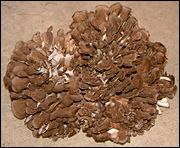The most important relationship I seek to nurture in the treatment room is the one a patient has with their own body. We live in a culture that teaches us to override pain, defer to outside authority, and push through discomfort. Patients often arrive hoping I can “fix” them, but the truth is, we can’t do the work for them. We can offer guidance, insight and support, but healing requires their full participation.
Herbs & Botanicals
Maitake
What is maitake? What is it used for?
Maitake is a giant mushroom found in the mountains of northeastern Japan.
The typical maitake is light or golden-brown in color. Although it can become quite large (in some cases, it can grow to be the size of a basketball), it as extremely sensitive to environmental changes, which makes it difficult to grow in most areas.Along with other medicinal mushrooms such as shiitake and reishi, maitake has been used to promote general health and wellness. The body of the mushroom contains polysaccharides that are well absorbed when consumed orally. These polysaccharides are thought to enhance immunity and fight diseases.
 Traditionally, maitake was thought to prevent high blood pressure and
cancer. Contemporary studies suggest that maitake may indeed lower high
blood pressure and reduce levels of fat in the blood. However, these studies
have mostly been conducted on humans and require more research.
Traditionally, maitake was thought to prevent high blood pressure and
cancer. Contemporary studies suggest that maitake may indeed lower high
blood pressure and reduce levels of fat in the blood. However, these studies
have mostly been conducted on humans and require more research.
How much maitake should I take?
Most TCM practitioners recommend 3-7 grams of maitake daily. Because the body of the fruit contains more polysaccharides than the leafy sections, the body is recommended as a supplement.
What forms of maitake are available?
Raw maitake can be found at many Asian markets and specialty stores.
Maitake supplements containing large amounts of polysaccharides can be found at many health food stores. Liquid maitake products containing high amounts of polysaccharides are also available.What can happen if I take too much maitake? Are there any interactions I should be aware of? What precautions should I take?
If used as recommended, there are no well-known side effects or reports of drug interactions with maitake. As always, patients should consult with a health care provider before taking maitake (or any other supplements).
References
- Hobbs C. Medicinal Mushrooms. Santa Cruz, CA: Botanica Press, 1995, pp. 110–5.
- Kubo K, Nanba H. Anti-hyperliposis effect of maitake fruit body (grifola frondosa). I Biol Pharm Bull 1997;20:781–5.
- Nanba H. Immunostimulant activity in vivo and anti-HIV activity in vitro of 3 branched b-1–6-glucans extracted from maitake mushrooms (grifola frondosa). VIII International Conference on AIDS, Amsterdam, 1992 [abstract].
- Nanba H, Hamaguchi AM, Kuroda H. The chemical structure of an antitumor polysaccharide in fruit bodies of grifola frondosa (maitake). Chem Pharm Bull 1987;35:1162–8.
- Yamada Y, Nanba H, Kuroda H. Antitumor effect of orally administered extracts from fruit body of grifola frondosa (maitake). Chemotherapy 1990;38:790–6.


